More than half of all physicians in the United States and a large percentage of those in four other English-speaking countries believe their ability to provide quality health care to patients has deteriorated over the past five years, according to a new international survey of doctors released today by the Harvard University School of Public Health and The Commonwealth Fund.
In addition, the survey finds that fewer than one of six U.S. physicians thinks his or her ability to provide quality care improved over the last five years, despite increased spending and medical advances seen in the same period. No more than a quarter of doctors in the other countries surveyed-Australia, Canada, New Zealand, and the United Kingdom-think their ability to deliver quality care has improved.
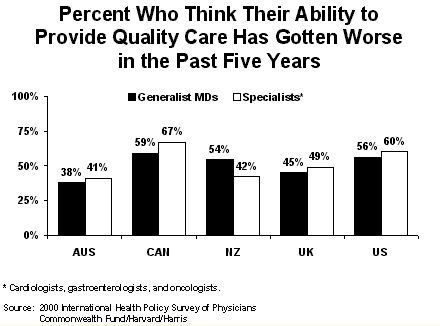 "These findings are alarming. What's worse is that many doctors in all five countries fear this decline in quality will continue," said Robert J. Blendon, survey author and professor of health policy and political analysis at Harvard University. "Doctors' concerns sound a wake-up call. The good news is that they don't view the situation as irreversible and offer concrete suggestions for improvement."
Among other findings, the survey shows doctors giving hospitals low marks in addressing medical errors. Doctors also find it a struggle to keep up with the latest developments in their fields. Shortages are also of concern: in the United States, a lack of nurses; in other countries, shortage concerns are broader. Waiting times for care is seen as a problem in all countries, except the United States, where doctors worry about patients' ability to afford care, notably prescription drugs. Doctors in all countries think spending more time with patients can improve quality and cite lack of time now as a major problem. Physicians also see improvement coming from new information technology, such as electronic prescribing and electronic medical records.
Doctors Give Hospitals Low Marks in Addressing Medical Errors and Find Themselves Struggling to Stay Up-to-Date
"These findings are alarming. What's worse is that many doctors in all five countries fear this decline in quality will continue," said Robert J. Blendon, survey author and professor of health policy and political analysis at Harvard University. "Doctors' concerns sound a wake-up call. The good news is that they don't view the situation as irreversible and offer concrete suggestions for improvement."
Among other findings, the survey shows doctors giving hospitals low marks in addressing medical errors. Doctors also find it a struggle to keep up with the latest developments in their fields. Shortages are also of concern: in the United States, a lack of nurses; in other countries, shortage concerns are broader. Waiting times for care is seen as a problem in all countries, except the United States, where doctors worry about patients' ability to afford care, notably prescription drugs. Doctors in all countries think spending more time with patients can improve quality and cite lack of time now as a major problem. Physicians also see improvement coming from new information technology, such as electronic prescribing and electronic medical records.
Doctors Give Hospitals Low Marks in Addressing Medical Errors and Find Themselves Struggling to Stay Up-to-Date
Across all five countries, many physicians give low marks to the job hospitals do finding and addressing errors. With the exception of the United States, approximately half of all specialists surveyed rate hospitals as fair or poor on medical errors tracking systems. In the United States, a third of specialists give hospitals a fair or poor rating on medical error tracking or correction systems. Twenty-nine percent of U.S. primary care doctors and 36 percent of Canadian primary care doctors rate their hospitals as fair or poor in this area, as do 45 percent of generalists in Australia and New Zealand, and more than half of generalists in the United Kingdom.
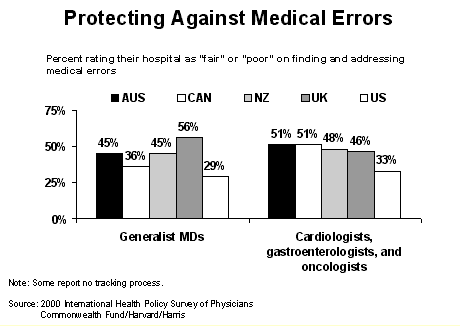 Many doctors say they are not encouraged to report medical errors. In Canada, New Zealand, and the United States, 64 percent, 46 percent, and 44 percent of specialists reported that they were either discouraged or not encouraged to report medical errors, with 38 percent of Australian and 28 percent of U.K. specialists sharing similar views.
Many doctors say they are not encouraged to report medical errors. In Canada, New Zealand, and the United States, 64 percent, 46 percent, and 44 percent of specialists reported that they were either discouraged or not encouraged to report medical errors, with 38 percent of Australian and 28 percent of U.K. specialists sharing similar views.
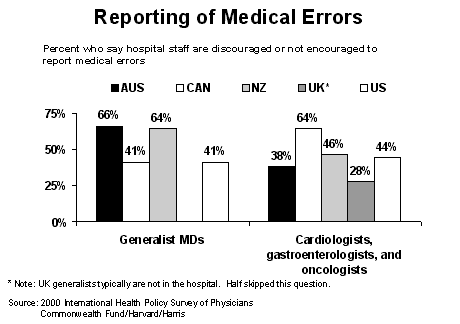 Physicians also express concern about their ability to keep abreast of new medical developments. Fewer than one of three primary care physicians in any country reports being very satisfied with his or her ability to remain knowledgeable and keep up. Four of 10 specialists in Australia, Canada, and the United States report being very satisfied, but only one of five specialists in New Zealand and one of four specialists in the United Kingdom report being very satisfied in their ability to keep up.
Doctors Voice Concern Over Shortages: Nurses in All Five Countries; Equipment, Professionals, and Facilities in Four Countries; Time Spent with Patients Also a Concern
Physicians also express concern about their ability to keep abreast of new medical developments. Fewer than one of three primary care physicians in any country reports being very satisfied with his or her ability to remain knowledgeable and keep up. Four of 10 specialists in Australia, Canada, and the United States report being very satisfied, but only one of five specialists in New Zealand and one of four specialists in the United Kingdom report being very satisfied in their ability to keep up.
Doctors Voice Concern Over Shortages: Nurses in All Five Countries; Equipment, Professionals, and Facilities in Four Countries; Time Spent with Patients Also a Concern
American physicians say the adequacy of nursing staff levels is their greatest concern about hospital resources, with half of primary care doctors and two-thirds of specialists rating nursing staff levels as fair or poor. This emerges as a key concern for U.S. doctors as the only resource widely viewed in short supply. A lack of nurses is also seen as a serious problem in the four other countries surveyed, particularly in the United Kingdom, where more than 80 percent of primary care and specialist doctors rate nursing staff levels as fair or poor.
A majority of doctors in Australia, Canada, New Zealand, and the United Kingdom voice concerns about the inadequate supply of hospital beds, home care, and long-term care facilities. Half or more of doctors in Canada and the United Kingdom also report shortages of medical specialists and diagnostic equipment in their communities.
In Canada and the United Kingdom, half of specialists and primary care doctors rate the adequacy of emergency rooms as fair or poor. Approximately one of three physicians in Australia and New Zealand reports the same concerns. While U.S. physicians tend to be more positive on questions of hospital resources, one-fourth rate emergency room facilities as only fair or poor.
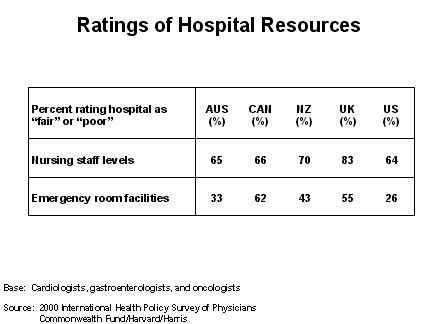 Primary care physicians across the five countries share a concern about not having enough time with patients. A third or more say this is a major problem in their medical practice, with more than 40 percent of U.S. and Canadian and more than 60 percent of U.K. primary care physicians voicing concerns about time constraints.
Referrals and Waiting Time Problematic Except in the United States, Where Doctors Worry that Patients Won't Be Able to Pay for Care and Lack Drug Coverage
Primary care physicians across the five countries share a concern about not having enough time with patients. A third or more say this is a major problem in their medical practice, with more than 40 percent of U.S. and Canadian and more than 60 percent of U.K. primary care physicians voicing concerns about time constraints.
Referrals and Waiting Time Problematic Except in the United States, Where Doctors Worry that Patients Won't Be Able to Pay for Care and Lack Drug Coverage
More than half of primary care doctors in all countries except the U.S. (29%) say waiting lists for specialist referrals are a major problem. This is especially true for generalists in the United Kingdom and New Zealand, where over 80 percent say waiting lists are a major problem. Waiting times for hospital and surgical care are reported as a major problem by half or more of generalists and specialists in all countries, except in the United States, where fewer than 10 percent of generalists and specialists report long waiting times.
When asked about waiting times for specific procedures, approximately nine of 10 primary care doctors in the United States and eight of 10 in the United Kingdom report that a woman with an ill-defined mass but no adenopathy requiring a breast biopsy would get the procedure within two weeks, compared with about two-thirds of doctors reporting the same waiting time in Canada and New Zealand. A majority of primary care doctors in four of the five countries say a 65-year-old patient requiring a routine hip replacement would have to wait more than six months for the procedure. Only 1 percent of primary care doctors in the United States report long waiting times for this surgery.
Only in the United States and New Zealand do a majority of primary care doctors see patients' out-of-pocket costs as a major problem: more than three of five primary care doctors in those countries say patients often have difficulty affording care. Physicians in both countries are very concerned that patients will not be able to pay for the care they need in the future.
The United States stands out on the issue of prescription drugs. About half of all U.S. doctors say that the affordability of prescription drugs for their patients is a major problem.
"This cross-national comparison highlights where the United States does well: in areas such as system responsiveness including access to the latest technology and waiting times, the United States leads many other countries," said Karen Davis, president of The Commonwealth Fund. "However, the United States does poorly on financial burdens on patients, inequality across population groups, and a variety of health outcomes. That is why we rank so low-number 37-in the World Health Organization overall health system ratings."
Doctors Say Information, Technology, and More Time with Patients Would Improve Quality
Concerning how quality might be improved, a substantial number of physicians in all five countries endorsed electronic prescribing and electronic patient medical records as "very useful." A majority of primary care doctors in Australia, New Zealand, and the United Kingdom say electronic prescribing of drugs is either very useful or would be very useful. Nearly half of generalists in Australia, Canada, New Zealand, and the United States think electronic patient medical records would be (or are) very useful, as do half or more of specialists in each country. United Kingdom generalist physicians are particularly supportive, with 68 percent viewing electronic medical records very useful. Most generalists and specialists (ranging from 60% to 80%) favor releasing information to the public about the quality of care provided by hospitals. And half or more view improved systems for reducing medical errors as a highly effective means to improve care quality.
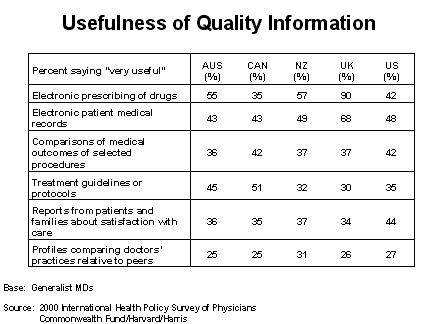 Almost three-fourths of primary care physicians in all five countries think spending more time with patients would help improve the quality of care they provide. Over one-third of primary care doctors also think that reports from patients and families about satisfaction with care are very useful.
Despite the problems they see with their respective health systems, the survey finds that physicians are more satisfied with their own health care systems overall than the public in each of the five countries. When asked in 1998, 14 percent to 33 percent of the public in the five countries called for a complete rebuilding of their health care system. In 2000, however, fewer than 12 percent of primary care physicians and just 8 percent of specialists across all five countries called for a complete rebuilding of the system. The great majority of doctors in all five countries also reported that they were satisfied with their own medical practices.
Survey Design
Almost three-fourths of primary care physicians in all five countries think spending more time with patients would help improve the quality of care they provide. Over one-third of primary care doctors also think that reports from patients and families about satisfaction with care are very useful.
Despite the problems they see with their respective health systems, the survey finds that physicians are more satisfied with their own health care systems overall than the public in each of the five countries. When asked in 1998, 14 percent to 33 percent of the public in the five countries called for a complete rebuilding of their health care system. In 2000, however, fewer than 12 percent of primary care physicians and just 8 percent of specialists across all five countries called for a complete rebuilding of the system. The great majority of doctors in all five countries also reported that they were satisfied with their own medical practices.
Survey Design
Practicing generalists and specialists were interviewed in each of the five nations by Harris Interactive and its subcontractors from April 27 to July 27, 2000. Interviews took place with 517 physicians in Australia; 533 in Canada; 493 in New Zealand; 500 in the United Kingdom; and 528 in the United States. The study restricted specialists to cardiologists, gastroenterologists, and oncologists. The survey was conducted by mail, with an online option, or by telephone. The margin of error for each country is plus or minus 4 percentage points.


